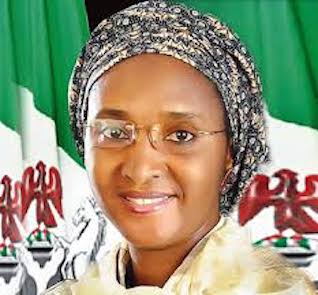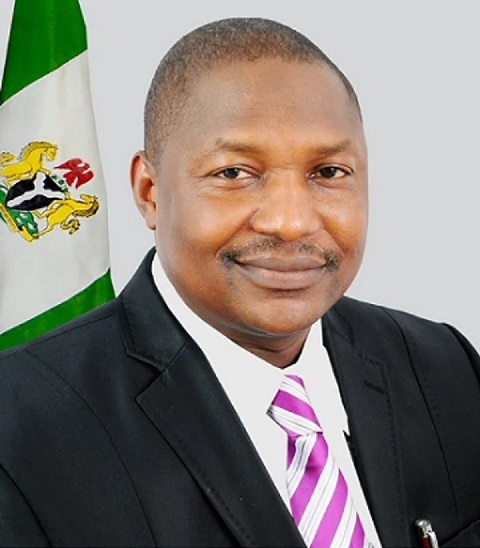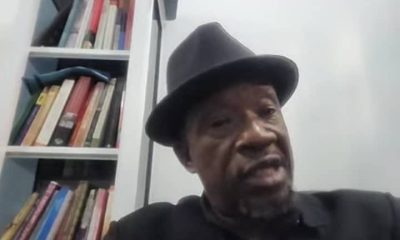COVER
FG Set to Implement Data, Calls Tariff Hike- Minister

By Tony Obiechina, Abuja
The Federal Government has stated that it was set to implement the new tariff hike of five percent on calls and data.
The Minister of Finance, Budget and National Planning, Mrs Zainab Ahmed confirmed the development at a stakeholders’ meeting, organised by the Nigerian Communications Commission (NCC) in Abuja on Thursday.
The Minister who was represented by the Assistant Director, Tax Policy, in the Ministry, Musa Umar, noted: “The five percent excise duty has been in the Finance Act 2020, but has never been implemented”.
She said government would begin the implementation of five percent excise duty tax on all voice calls, SMS and data services, in addition to the existing 7.
5 percent Value Added Tax (VAT), paid for goods and services across all sectors of the economy.“Henceforth, the five percent excise duty will be collected by telecom operators and payment made to the federal government on a monthly basis, on or before 21st of every month.”
Concerning the five percent hike, the Minister of Communication and Digital Economy, Prof Isa Pantami had disclosed that there was a circular stating the planned hike which was addressed to his ministry and other relevant ministries and agencies of government.
The circular Referenced No. F. 17417/VI/286 dated 1st March 2022, and titled “Approval for Implementation of the 2022 Fiscal Policy Measures and Tariff Amendments” was addressed to different Ministers, including Honourable Minister, Communications and Digital Economy and other heads of government agencies.
The circular was also addressed to the Secretary to the Government of the Federation, Attorney-General of The Federation, Ministers of Industry, Trade and Investment, Agriculture and Rural Development, Mines and Steel and Development; among others.
The circular signed by Mrs. Ahmed reads: “A grace of ninety (90) days commencing from the date of implementation of this circular i.e April 1, 2022, shall be granted to all importers who had opened Form M and must have entered into irrevocable trade agreement before the coming into effect of this circular to process and clear these goods at the prevailing duty rates.
“However new import transaction entered from the 1st of April 2022 will be subjected to the new import duty regime,” she said.
Recall that the Finance Act, 2020 introduced ‘Telecommunication Services’ provided in Nigeria to be liable to excise duty under Section 21 (2) of the Customs and excise tariff etc. (Consolidation) Act, CAP. C49, LFN 2004.
A statement by the Minister’s SpecialAdviser on Media and Communications, YunusaTanko Abdullahi noted that this development, “therefore, means that all stakeholders have by that singular provision been aware of the Act”.
He said, “The excise duty on telecommunication services provided in Nigeria introduced through the Finance Act, 2020 with statutory enactment on 1st January, 2021 is yet to be implemented till date.
“This is considering the need to ensure reasonable transition period before the implementation of the new tax, as well as providing clarity to all stakeholders on implementation modalities.
“As a matter of emphasis, Mrs. Ahmed had vide Circular dated 1st March, 2022 informed the Nigeria Customs Service (NCS) and other heads of government ministries, departments and agencies (MDAs), including the Federal Ministry of Communication & Digital Economy about Mr. President’s approval of the implementation of the five percent excise duty on telecommunication services with effect from 1st June, 2022.
“The circular provided a 90-day moratorium with effect from 1st March, 2022 before the implementation of the excise tax. Currently, the excise tax is yet to be implemented.
“An issue as serious as the excise tariff cannot be taken single handedly, as all stakeholders and agencies have been involved including Manufacturers Association of Nigeria (MAN) and Association of Telecom Operators of Nigeria (ALTON), who wrote to the Ministry to be involved in the modalities for implementation of the excise duty.”
It could be recalled that Prof. Pantami rejected the planned implementation of five percent excise duty in the Nigerian telecoms sector.
He expressed his disapproval for the policy at a telecom forum in Lagos, organised by the Nigeria Office for Developing the Indigenous Telecoms Sector (NODITS), an agency domiciled in the Nigeria Communications Commission (NCC).
He said that he would explore every legitimate means to stop the planned five percent excise duty tax on telecom consumers, faulting the timing and process of imposing the tax on the telecom industry, insisting that part of the responsibility of a responsive government was not to increase the challenges citizens were facing.
“I have not been contacted officially. If we are, we surely will state our case. The sector that contributes to the economy should be encouraged. You introduce excise duty to discourage luxury goods like alcohol, but broadband in the telecom sector is a necessity,” he said further.
Continuing, the Finance Minister’s spokesman said, “zIn view of the above position of Prof. Pantami, there could be the question whether he was absented in the whole processes that resulted in the Finance Act, which is a product of both the National Assembly and Federal Executive Council (FEC).
“Suffice this to say that before the Act, the Finance Bill would have been through the FEC of which Prof. Pantami is a member and the National Assembly. In other words, he was involved in the making of the Finance Act which spells the said excise tariff hike policy.
“Therefore, he could not obviously have had a point in his dissenting views even as the National Assembly could not have contradicted itself on this matter, because the parliament had passed the Finance Bill before President Muhammadu Buhari signed it into law.
“Although Nigeria is celebrated as the largest economy in Africa, translating this wealth into revenues remains a challenge. Considering this in line with the provision of the revised National Tax Policy which provides the framework for a sustainable tax system that would ensure reliable sources of revenue to government and support economic development.
“Subsequently, in line with the Finance Act, the federal government introduced “Telecommunication Services” provided in Nigeria to be liable to excise duty under Section 21 (2) of the Customs and Excise Tariff etc. (Consolidation) Act, CAP. C49, LFN 2004.
“Nigeria is one of the largest telecommunication markets in Africa. Available report from the NCC shows four categories of operators, i.e. mobile (GSM), fixed telephony operators (fixed/ fixed wireless), internet service providers (ISPS) and others (operators other than mobile & fixed telephony, ISPs).
“Subscriber number continues to grow substantially, having increased from about 180 million subscribers in 2019 to over 200 million active subscriptions in 2020. This represents an increase of over nearly 11 percent in total subscriptions. Moreover, many countries in sub-Saharan Africa such as Tanzania, Uganda, Malawi, Kenya, Rwanda, Ghana and Burundi currently imposed excise duty on telecommunication services ranging between five percent to 20 percent”.
COVER
DAILY ASSET Appoints Torough, Editor, Names Eze, Deputy

By Laide Akinboade, Abuja
As part of efforts to reposition the newspaper for optimum corporate performance, the management of Asset Newspapers Limited, Publishers of DAILY ASSET, has announced the appointment of David Torough as the Editor of the Abuja-based national daily.
A statement by the management said the appointments were part of the company’s new strategy to further penetrate the various states in the country and raise its readership and patronage.
“DAILY ASSET is widely acceptable across the country and to maintain our leadership position, we need to increase management presence, hence the need to create new Bureau offices in some locations outside Abuja and Lagos,” the statement quoted the Publisher/ Editor-in-Chief, Dr Cletus Akwaya to have said.
In a statement yesterday, Publisher and Editor-in-Chief of the fast-growing daily, Dr. Cletus Akwaya said the appointment was part of the new strategy to properly situate the paper for better productivity.
“DAILY ASSET has a commitment with the Nigerian people. We are determined to weather the storm and give Nigerian readers a Newspaper that satisfies their yearnings and reading pleasure and we can only do that with the right set of professionals,” the statement said.
Akwaya, a former Commissioner of Information from Benue State said the difficult times being faced by Nigerians posed a great challenge to the media as the people deserved credible information with which to make choices.
“We have a bond with the people, to offer credible information at all times in the best tradition of the Nigerian Press and on this scale of objectivity, truth and fairness, we pledge to remain steadfast no matter the challenges,” Akwaya was quoted to have said.
He said the newspaper will maiantin its daily print run and circulation to all states of the federation and urged advertisers to take advantage of the deep penetration of the Daily Asset brand to send their messages.
Torough, the new Editor has had a steady rise in the Newspaper in the last five years.
A graduate of Mass communication of the Benue State University, Makurdi, Torough joined the company in 2022 as Benue State Correspondent. He was spotted for his brilliance and redeployed to Abuja the following year and promoted to Deputy News Editor. He was subswuently named Deputy Editor of the paper, a position he held until the recent appointment.
Torough has attended several journalistic workshops and trainings to properly equip himself for the task ahead.
The statement also said the Management named Eze Okechukwu as Deputy Editor.
Before his elevation as Deputy Editor, Eze has been Deputy Politics Editor and DAILY ASSET Newspaper correspondent covering the Senate, having joined the organization in 2021.
Born on March 10, 1975, Eze holds a Masters Degree in Mass Communication from the Enugu State University of Science and Technology.
Eze began his journalism career with Daily Star, Enugu and later worked with Daily Trust Newspaper, Abuja as sports reporter.
Aside from his journalistic excellence, he has a great deal of passion for sports.
COVER
Insecurity: Northern Govs, Monarchs Seek Six-month Mining Suspension

From Ngutor Dekera, Kaduna and Aliyu Askira, Kano
Northern governors and traditional rulers yesterday called for the suspension of mining activities across the region for six months, blaming illegal mining for worsening insecurity in many states.The resolution was contained in a communiqué issued after a joint meeting of the Northern States Governors’ Forum and the Northern Traditional Rulers’ Council held at the Sir Kashim Ibrahim House, Kaduna.
The meeting, chaired by the Gombe State Governor and NSGF Chairman, Muhammadu Yahaya, had in attendance the 19 northern governors and chairmen of the 19 states’ traditional councils. The Forum expressed concern over the escalating violence in parts of the North, including the killings and abductions recently recorded in Kebbi, Kwara, Kogi, Niger, Sokoto, Jigawa and Kano states, as well as renewed Boko Haram attacks in Borno and Yobe.“The Forum extends its deepest condolences and solidarity to the governments and good people of the affected states,” the communiqué said, noting that the attacks on schoolchildren and other citizens had become “unacceptable tragedies” that required urgent collective action.It commended President Bola Tinubu for what it described as the Federal Government’s “firm response” to recent abductions and insurgency threats, especially the rescue of some abducted pupils.The governors also saluted security agencies for their sacrifices on the frontlines.“We resolved to renew our support for every step taken by the President and Commander-in-Chief to take the fight to insurgents’ enclaves in order to end the criminality,” the Forum stated.A major highlight of the meeting was the North’s renewed push for the establishment of state police, with governors and traditional rulers insisting that decentralised policing had become inevitable.“The Forum reaffirms its wholehearted support and commitment to the establishment of state police,” the communiqué added, urging federal and state lawmakers from the region to “expedite action for its actualisation.”On illegal mining, the governors said criminal mining networks were fuelling violence and providing resources for armed groups.As a corrective measure, they asked Tinubu to direct the Minister of Solid Minerals to impose a six-month suspension of mining activities in order to allow for a full audit and revalidation of licences.“The Forum observed that illegal mining has become a major contributory factor to the security crises in Northern Nigeria. “We strongly recommend a suspension of mining exploration for six months to allow proper audit and to arrest the menace of artisanal illegal mining,” it said.To strengthen the fight against insecurity, the governors also announced the creation of a regional Security Trust Fund.Under the proposed arrangement, each state and its local governments will contribute ₦1bn monthly, to be deducted at source under an agreed framework.They said the fund would help provide sustainable financing for joint operations, intelligence-driven interventions and coordinated security responses across the region.At the end of the meeting, the Forum reaffirmed its commitment to unity and collective responsibility.“Only through unity, peer review and cooperation can we overcome the pressing challenges before us,” it declared.The Forum agreed to reconvene on a date to be announced.Meanwhile, Nigeria’s worsening security crisis took a grim turn on Monday as bandits launched fresh attacks in Kano State, abducting 25 villagers, even as the Federal Government raced to secure the release of more than 300 Catholic school children kidnapped in Niger State.In the early hours of Monday, armed bandits invaded Unguwar Tsamiya—popularly called Dabawa—in Shanono Local Government Area of Kano State, whisking away nine men and two women after shooting into the air and assaulting residents. The attackers also rustled two cows.A resident lamented the community’s helplessness: “We cannot do otherwise; most of us cannot leave because we have nowhere to go. This is our place, our land and everything is here.”The assault came less than 24 hours after a similar attack on Yan Kamaye in Tsanyawa LGA, a community along the volatile Katsina border.In Niger State, National Security Adviser Nuhu Ribadu has assured distraught families of St. Mary’s Co-Education School, Kontagora that the more than 300 students and staff abducted on November 21 will return home “soon.” Ribadu, who led a high-level federal delegation to the school on Monday, said the abductees are safe, though he offered no specifics on their location or the status of rescue operations.According to Daniel Atori, spokesman for the Catholic bishop overseeing the school, the NSA reassured officials: “The children are where they are and will come back safely.”The St. Mary’s attack is part of a worrying resurgence of mass kidnappings reminiscent of the 2014 Chibok schoolgirls’ abduction. Security analysts warn that banditry has evolved into a “structured, profit-seeking industry,” with hundreds of Nigerians abducted in November alone.The Kontagora school abduction occurred the same week 25 girls were kidnapped in Kebbi State—victims who authorities say have since been rescued through “non-kinetic” means. About 50 of the St. Mary’s hostages have also managed to escape.Ribadu’s delegation, which included the Minister of Humanitarian Affairs and the Director-General of the Department of State Services (DSS), reaffirmed the government’s commitment to securing the freedom of all abducted citizens.As communities from Kano to Niger continue to bear the brunt of these violent incursions, the escalating spate of kidnappings underscores the urgent national demand for a more decisive and coordinated security response.COVER
Abacha Loot Probe: Malami Faces EFCC Panel Daily in December

By David Torough, Abuja
The Economic and Financial Crimes Commission (EFCC) said former Attorney‑General of the Federation and Minister of Justice, Abubakar Malami, will face a team of interrogators at its office daily throughout December.A credible source in the EFCC said on Monday that the daily appearance was part of an ongoing investigation into the whereabouts of an alleged 490 million dollars Abacha loot secured through a Mutual Legal Assistance (MLAT) request.
The source said that Malami, who was summoned for interrogation by the EFCC on Saturday, was barred from leaving Nigeria for the next one month.According to the source, one of the conditions for his release on Saturday was that he should report daily to the EFCC Headquarters in Abuja for further interrogation.The source said Malami would have to appear daily at the anti-graft office due to the volume of the investigation and the seriousness of the charges against him.”We seized his passport, it is the normal routine during investigation, but he has to report at the EFCC headquarters in Abuja every day for the next month.”He will be reporting for further investigation throughout December.”He will be reporting every day, starting from Dec. 1st to Dec. 31st.He will appear before the team of investigators for the entire month of December.”He will be reporting to EFCC for investigation for the period because of the volume of the investigation and the seriousness of the charges against him,” the source added.According to the source, a fact sheet on the former minister revealed that Malami had several issues to clarify with the EFCC within the coming weeks.“We have asked him to explain the whereabouts of the $490 million Abacha loot secured through MLAT.“We didn’t say he stole money, but he should account for the loot. This is one of the issues he will clarify to our investigators.”The commission cited the large volume of documents he must review and the need for extensive interviews as reasons for seizing his passport.The source said EFCC would not engage in a war of words but would release its findings after a thorough investigation.Malami, in a statement by his media aide, Mohammed Doka, on Monday in Abuja, however, described the EFCC investigation as a political witch‑hunt.He confirmed he honored an EFCC invitation on Nov. 28, describing the engagement as fruitful and expressing confidence that the probe would vindicate him.Malami described the EFCC’s allegations as baseless, illogical and devoid of substance, insisting they collapse under factual scrutiny.















